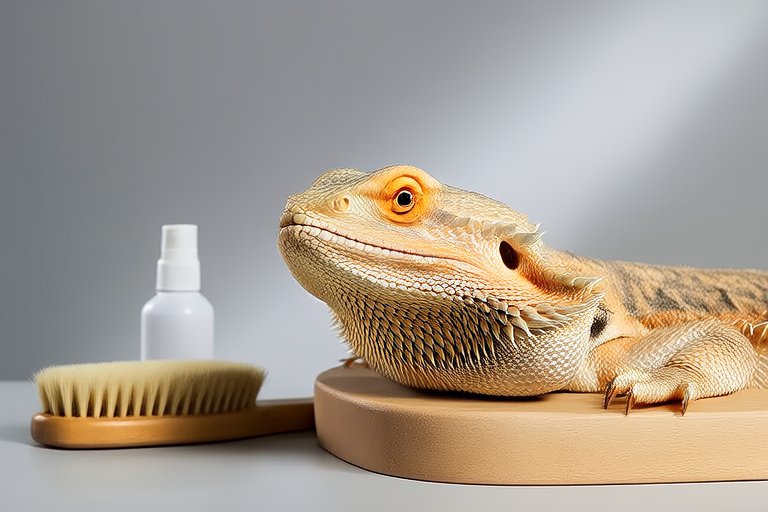Bearded Dragon Care: Expert Tips Every Owner Should Know
Welcome to the world of bearded dragon ownership! These fascinating reptiles are popular pets due to their unique appearance and relatively easy care requirements. However, owning a bearded dragon comes with responsibilities that require attention to detail. This guide will provide you with comprehensive insights into bearded dragon care, covering everything from diet and habitat setup to temperature and lighting requirements, health monitoring, and debunking common myths.
Dietary Needs
A well-balanced diet is crucial for your bearded dragon’s health and longevity. Bearded dragons are omnivores, meaning they eat both plant matter and animal protein. The dietary needs vary depending on the age of your pet.
Hatchlings and Juveniles
Young bearded dragons need a diet rich in calcium and protein. Feed them crickets, mealworms, and waxworms daily, dusted with a calcium supplement. Include leafy greens like collard greens, mustard greens, and dandelion greens in their diet. Avoid iceberg lettuce as it lacks nutritional value.
Adult Dragons
As bearded dragons mature, their dietary needs shift towards more vegetation. Offer a mix of vegetables and fruits, such as carrots, squash, and berries. Continue providing insects but reduce the frequency to once or twice a week. Ensure that all food items are appropriately sized for your dragon to prevent choking hazards.
Habitat Setup
The right habitat setup ensures your bearded dragon thrives. Start by choosing an appropriate enclosure size. Hatchlings can live in a 20-gallon tank, while adults require at least a 40-gallon tank. Provide branches, rocks, and hides for climbing, basking, and resting.
Substrate Options
Choose a substrate that is safe and easy to clean. Reptile carpet, paper towels, or tile work well. Avoid substrates like sand or wood shavings, which pose ingestion risks.
Temperature and Lighting Requirements
Maintaining proper temperatures and lighting is vital for your bearded dragon’s health. A gradient of temperatures within the enclosure allows your dragon to thermoregulate.
Heating
Use a combination of heat lamps and under-tank heaters to achieve a basking spot of 95-105°F (35-40°C) and a cool end of 75-85°F (24-29°C). Nighttime temperatures can drop to around 65-75°F (18-24°C).
Lighting
Install UVB lighting to promote calcium absorption and prevent metabolic bone disease. Replace bulbs every six months, even if they still appear functional. Ensure your dragon has access to direct sunlight when possible, but always supervise them outside.
Health Monitoring
Regular health checks help catch issues early. Look out for signs of illness such as lethargy, loss of appetite, discharge from eyes or nose, and difficulty breathing. Consult a veterinarian specializing in reptiles if you notice any concerning symptoms.
Common Myths Debunked
Several misconceptions exist regarding bearded dragon care. Let’s address some of these:
Myth: Bearded Dragons Don’t Need Water
Contrary to this belief, bearded dragons do need water. Provide a shallow dish for drinking and soaking. Some dragons may not drink from standing water, so misting them occasionally helps keep them hydrated.
Myth: Bearded Dragons Can Survive on a Diet of Insects Alone
This is false. While insects are an important part of their diet, especially for younger dragons, they also require plant-based foods to meet their nutritional needs fully.
Myth: Bearded Dragons Don’t Need UVB Lighting
UVB lighting is essential for calcium absorption and overall health. Lack of UVB exposure can lead to serious health problems.
Considerations for Different Life Stages
Understanding the specific needs of your bearded dragon at various stages of life helps ensure optimal care.
Hatchlings
Hatchlings require more frequent feeding and closer attention to temperature and humidity levels. They are more susceptible to dehydration and temperature extremes, so monitor them closely.
Juveniles
Juvenile bearded dragons grow rapidly and need plenty of calcium and protein. Continue offering a varied diet and ensure adequate space for exercise and growth.
Adults
Adult bearded dragons have more stable dietary needs but still require regular health checks. They benefit from a spacious environment that encourages natural behaviors.
Expert Advice
Consult with veterinarians specializing in reptiles for personalized advice tailored to your bearded dragon’s specific needs. They can provide guidance on nutrition, healthcare, and behavioral issues.
Practical Tips for Daily Care
Incorporate these practical tips into your daily routine:
- Handle your dragon gently to build trust.
- Feed them at consistent times each day.
- Monitor their behavior for changes that might indicate health issues.
- Keep the enclosure clean and free from waste.
Owning a bearded dragon is a rewarding experience. By following these expert tips and guidelines, you’ll provide your scaly friend with the best possible care throughout its life. Remember, each bearded dragon is unique, so tailor your approach based on individual needs and preferences.
